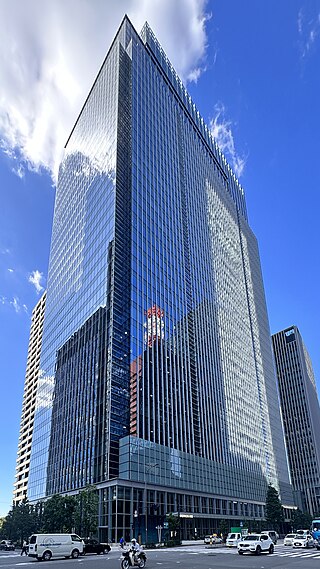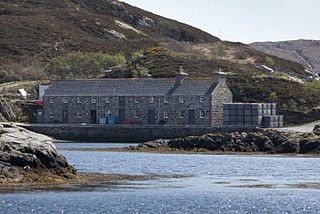
Aquaculture, also known as aquafarming, is the controlled cultivation ("farming") of aquatic organisms such as fish, crustaceans, mollusks, algae and other organisms of value such as aquatic plants. Aquaculture involves cultivating freshwater, brackish water and saltwater populations under controlled or semi-natural conditions, and can be contrasted with commercial fishing, which is the harvesting of wild fish. Aquaculture is also a practice used for restoring and rehabilitating marine and freshwater ecosystems. Mariculture, commonly known as marine farming, is aquaculture in seawater habitats and lagoons, as opposed to freshwater aquaculture. Pisciculture is a type of aquaculture that consists of fish farming to obtain fish products as food.

Salmon is the common name for several commercially important species of euryhaline ray-finned fish from the genera Salmo and Oncorhynchus of the family Salmonidae, native to tributaries of the North Atlantic (Salmo) and North Pacific (Oncorhynchus) basins. Other closely related fish in the same family include trout, char, grayling, whitefish, lenok and taimen, all coldwater fish of the subarctic and cooler temperate regions with some sporadic endorheic populations in Central Asia.

Fish farming or pisciculture involves commercial breeding of fish, most often for food, in fish tanks or artificial enclosures such as fish ponds. It is a particular type of aquaculture, which is the controlled cultivation and harvesting of aquatic animals such as fish, crustaceans, molluscs and so on, in natural or pseudo-natural environments. A facility that releases juvenile fish into the wild for recreational fishing or to supplement a species' natural numbers is generally referred to as a fish hatchery. Worldwide, the most important fish species produced in fish farming are carp, catfish, salmon and tilapia.
Infectious salmon anemia (ISA) is a viral disease of Atlantic salmon caused by Salmon isavirus. It affects fish farms in Canada, Norway, Scotland and Chile, causing severe losses to infected farms. ISA has been a World Organisation for Animal Health notifiable disease since 1990. In the EU, it is classified as a non-exotic disease, and is monitored by the European Community Reference Laboratory for Fish Diseases.

Nissui Corporation, is a marine products company based in Tokyo, Japan. Formerly known as Nippon Suisan Kaisha Ltd. from 31 March 1937 to 30 November 2022, it officially changed its name to its common abbreviation on 1 December 2022.
Mowi ASA, formerly known as Marine Harvest ASA, , is a Norwegian seafood company with operations in a number of countries around the world. The company's primary interest is fish farming, primarily salmon, the operations of which are focused on Norway, Scotland, Canada, the Faroe Islands, Ireland and Chile. The group has a share of 25 to 30% of the global salmon and trout market, making it the world's largest company in the sector. Mowi also owns a 'value added processing' unit, which prepares and distributes a range of seafood products, and a number of smaller divisions.

Mitsui & Co., Ltd. is one of the largest sogo shosha in Japan; it is part of the Mitsui Group.

Lerøy Seafood Group ASA is a seafood production and distribution company based in Bergen, Norway

Grieg Seafood is an international seafood company with fish farms in Rogaland and Finnmark in Norway, British Columbia and Shetland. The company specializes in fresh Atlantic salmon. It has an annual production of 80,000 tonnes of salmon and trout. The company is based in Bergen, Norway, and listed on the Oslo Stock Exchange.
SalMar ASA is a Norwegian fish farm company and one of the world's largest producers of farmed salmon. The company's main activities include marine-phase farming, broodfish and smolt production, processing and sale of farmed salmon. It holds 100 licenses for production of Atlantic salmon in Norway, located in Trøndelag, Nordmøre and, through its subsidiary Senja Sjøfarm AS, Troms. It also owns 50% of Norskott Havbruk which operates fish farms as Scottish Sea Farms. The company is based in Frøya and is listed on the Oslo Stock Exchange since 2007. The company was founded in 1991, its main shareholder is today the founder's son Gustav Magnar Witzøe.

Aquaculture started to take off in New Zealand in the 1980s. It is dominated by mussels, oysters and salmon. In 2007, aquaculture generated about NZ$360 million in sales on an area of 7,700 hectares. $240 million was earned in exports.

The aquaculture of salmonids is the farming and harvesting of salmonid fish under controlled conditions for both commercial and recreational purposes. Salmonids, along with carp and tilapia, are the three most important fish groups in aquaculture. The most commonly commercially farmed salmonid is the Atlantic salmon.
Seafood in Australia comes from local and international commercial fisheries, aquaculture and recreational anglers. It is an economically important sector, and along with agriculture and forestry contributed $24,744 million to Australia's GDP in year 2007–2008, out of a total GDP of $1,084,146 million. Commercial fisheries in Commonwealth waters are managed by the Australian Fisheries Management Authority, while commercial and recreational fishing in state waters is managed by various state-level agencies.
Skretting is the world's largest producer of feeds for farmed fish.
Organic aquaculture is a holistic method for farming fish and other marine species in line with organic principles. The ideals of this practice established sustainable marine environments with consideration for naturally occurring ecosystems, use of pesticides, and the treatment of aquatic life. Managing aquaculture organically has become more popular since consumers are concerned about the harmful impacts of aquaculture on themselves and the environment.

Diseases and parasites in salmon, trout and other salmon-like fishes of the family Salmonidae are also found in other fish species. The life cycle of many salmonids is anadromous, so such fish are exposed to parasites in fresh water, brackish water and saline water.

P/F Bakkafrost is a Faroese salmon farming company based in Glyvrar on the island of Eysturoy in the Faroe Islands. Bakkafrost is the largest fish farming company in the Faroe Islands, and is the biggest private employer in the islands. Bakkafrost is the third-largest fish farming company in the world.

Loch Duart is a small, independent Scottish salmon farming company. It is headquartered in Scourie, Sutherland in north-west Scotland and has just over 100 employees. The company owns and operates eight sea sites and two hatcheries in Sutherland and the Outer Hebrides. Sales, marketing and finance departments are located in Montrose and a French sales and marketing office in Lorient, Brittany.

Aquaculture in the United Kingdom is dominated by salmon farming, then by mussel production with trout being the third most important enterprise. Aquaculture in the United Kingdom represents a significant business for the UK, producing over 200,000 tonnes of fish whilst earning over £700 million in 2012 (€793 million).
Russian Aquaculture PJSC is Russia's largest fish farming company. It operates fish farms and markets in addition to chilled and frozen salmon and trout farmed on lakes in Karelia, and in the Barents and White Seas.













